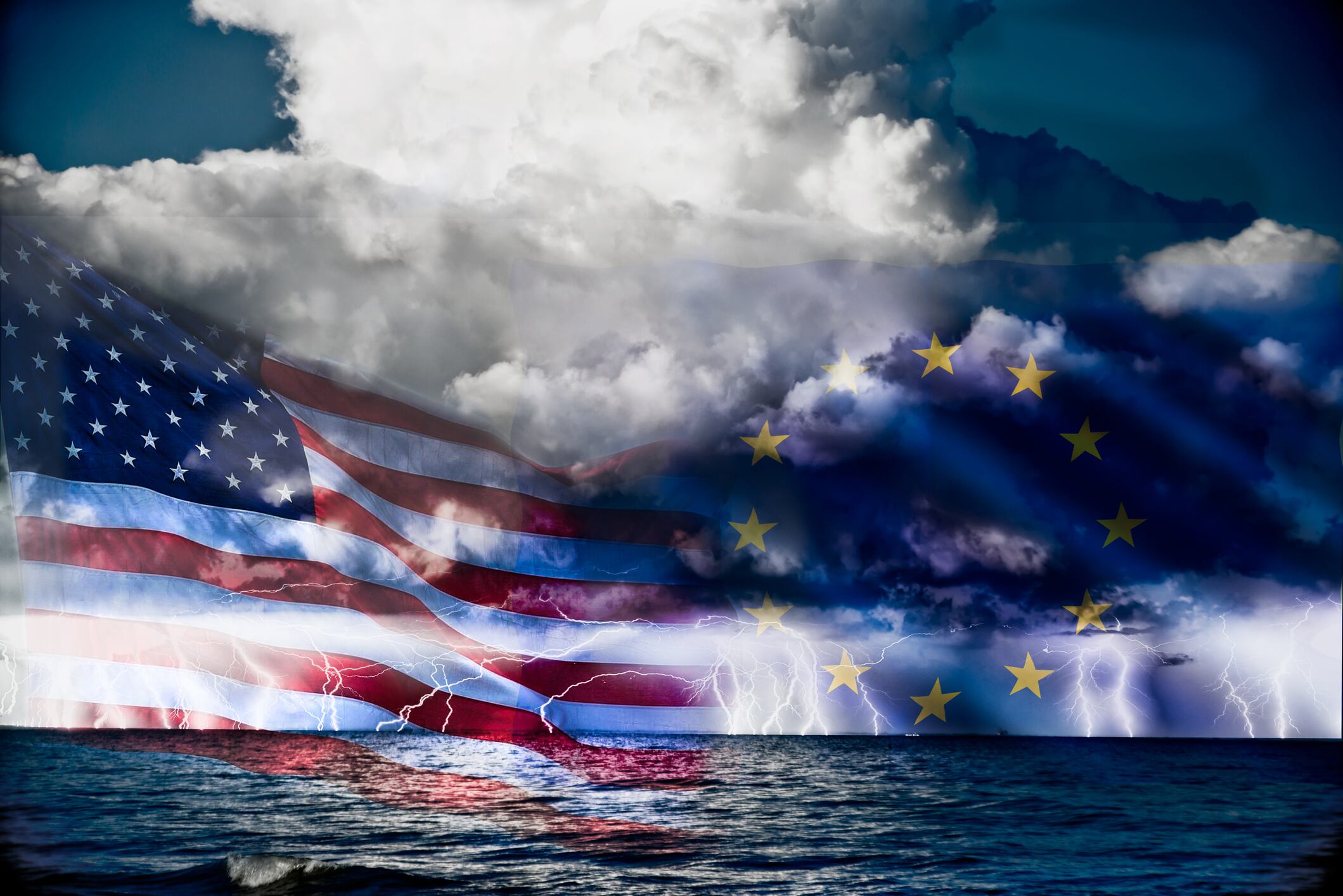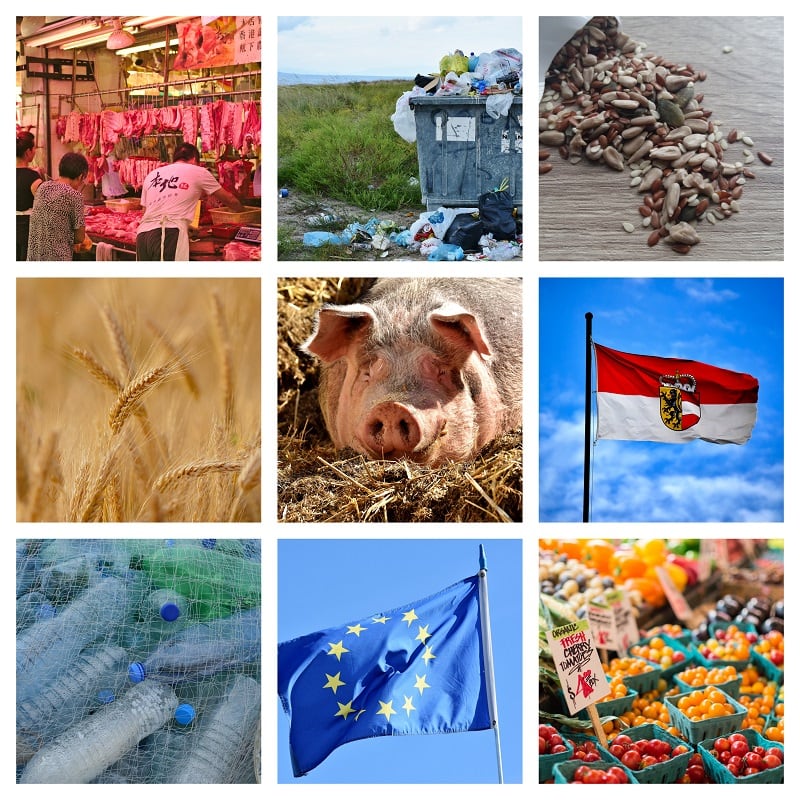President Donald Trump’s administration plans to impose retaliatory tariffs on $7.5bn (€6.8bn) of goods it imports from the EU on 18 October, in response the WTO Airbus subsidy case, which has been rumbling for 15 years.
The tariffs include 25% duties on various cheeses, olive oil, olives, whey protein concentrates and frozen meat from Germany, Spain and the UK; 25% tariffs on sweet biscuits, waffles and wafers from Germany and the UK; 25% tariffs on certain pork products, mussels, cockles, clams, clementines, cherries, butter and yogurt from multiple countries; 25% tariffs on liqueurs and cordials from Germany, Ireland, Italy, Spain and UK; and 25% duties on single-malt Irish and Scotch whiskies.
Brussels has threatened to retaliate similarly against US goods.
What’s included in the US tariffs (full list here):
- Edam, Gouda, Reggiano, Cheddar, Swiss, Stilton, Emmentaler and Pecorino cheese
- Olives
- Pork sausages
- Cherries
- Pears
- Prune juice
- Mandarins
- Coffee
- Clams, Mussels, Cockles
- Sweet biscuits
‘An alarming decision’
FoodDrinkEurope (FDE), representing Europe’s food and drink industry, called the move an ‘alarming decision that will severely impede access for European food and drinks to the US market’.
The US is currently the industry’s first foreign destination with a value of exports exceeding €20 billion in 2018. This corresponds to a share of about 18% of total extra-EU food and drink exports. In turn, EU imports of US food and drink products exceeded €5 billion in 2018. This corresponds to a share of about 7% of total extra-EU food and drink imports.
FDE now has serious concerns about the collateral damage that the WTO civil aircraft disputes will have on ‘our well-established EU-US food and drink industry relations’. It warned that Europe’s food and drink manufacturers, 99% of which are small and medium-sized enterprises, could end up paying the price for a dispute originating in a completely unrelated sector. “Not only will this be detrimental to the food industry itself, but it would also have hugely negative broader implications for supply chains, workers and consumers in the EU and in the US,” it said in a statement.
Mella Frewen, Director General of FDE, added: “We urge the EU and US to engage in a constructive dialogue to swiftly resolve the aircraft disputes and to avoid further escalation of trade tensions. All efforts should focus on a positive trade agenda which aims to strengthen our long-standing transatlantic trade relations.”
An attempt to cause ‘the greatest possible economic and political damage to Europe’
Meanwhile, the Spanish Federation of Food and Beverage Industries (FIAB) has asked the Government of Spain and the authorities of EU for maximum collaboration to avoid the imposition of tariffs on some Spanish foods and beverages with which the US has threatened Europe.
“This tariff policy, whose sole objective is to cause the greatest possible economic and political damage to Europe, encloses the food and beverage industry within this trade war with the consequent loss of competitiveness for Spanish companies vis-à-vis other international operators and the negative impact on national employment,” said Mauricio García de Quevedo, CEO of FIAB.
He also warned the tariffs could negatively impact a ‘significant number’ of related sectors such as the primary sector, distribution and transport sectors that represent a fundamental part of the Spanish economy.
With goods worth €1,728 million exported in 2018, the US is currently the first destination market for Spain’s food and beverage exports after the EU.
Among the Spanish products that will be affected by the levies are fresh cheese, olives, olive oil, pig products and wine, whose exports the US market as a whole represents about €1,000 million.
‘This is a blow to the Scotch Whisky industry’

The Scotch Whisky Association also responded with dismay. The value of Scotch Whisky exports to the US grew from £280 million in 1994 to over £1 billion last year to a value of £344 million, or $463 million, according to the HMRC. Over 135 million bottles of Scotch Whisky were exported to the US in 2018 - more than four bottles per second.
Karen Betts, chief executive of the SWA, said the tariffs will ‘undoubtedly damage the Scotch Whisky sector’. “This is a blow to the Scotch Whisky industry. Despite the fact that this dispute is about aircraft subsidies, our sector has been hit hard, with Single Malt Scotch Whisky representing over half of the total value of UK products on the US Government tariff list (amounting to over $460 million).
“The Scotch Whisky industry has consistently argued against the imposition of tariffs in our sector. For the last 25 years, trade in spirits between Europe and the US has been tariff-free. In that time, exports of Scotch Whisky to the US and of American Whiskey to the UK and Europe have grown significantly, benefitting communities on both sides of the Atlantic, boosting investment, employment and prosperity for all. For this reason, the Scotch Whisky Association - alongside American and European spirits producers - has urged the EU and the US not to draw spirits into trade disputes that have nothing to do with our sector.”
She called for urgent action to de-escalate the trade disputes that have given rise to these tariffs, to “ensure that these latest tariffs are not implemented on 18 October, and to ensure that other tariffs – including on the export of American Whiskey to the EU – are removed quickly.
“In particular, the UK government must now work with both sides to urge a negotiated settlement and to ensure that these damaging tariffs do not take effect.”
‘Short-sighted and counterproductive’
European farmers also regret the decision. Industry body Copa and Cogeca called for negotiations to find mutually beneficial solutions for what is after all a non-agricultural matter.
Pekka Pesonen, Copa and Cogeca Secretary General said “We deeply regret that the agricultural sector is once again paying the bill for a political decision on trade that has nothing to do with agriculture. As Commissioner Malmström said, creating volatility in international trade could be short-sighted and counterproductive not only for international trade but also regarding the key challenges that EU and US farming communities will have to face in the fight against climate change, food security and generational renewal. Farmers, on both sides of the Atlantic need stability and trust in order to make long term investments to remain competitive and attractive. We call on decision makers to create a more predictable trade environment, for the benefit of the farming community and consumers across the world.”



